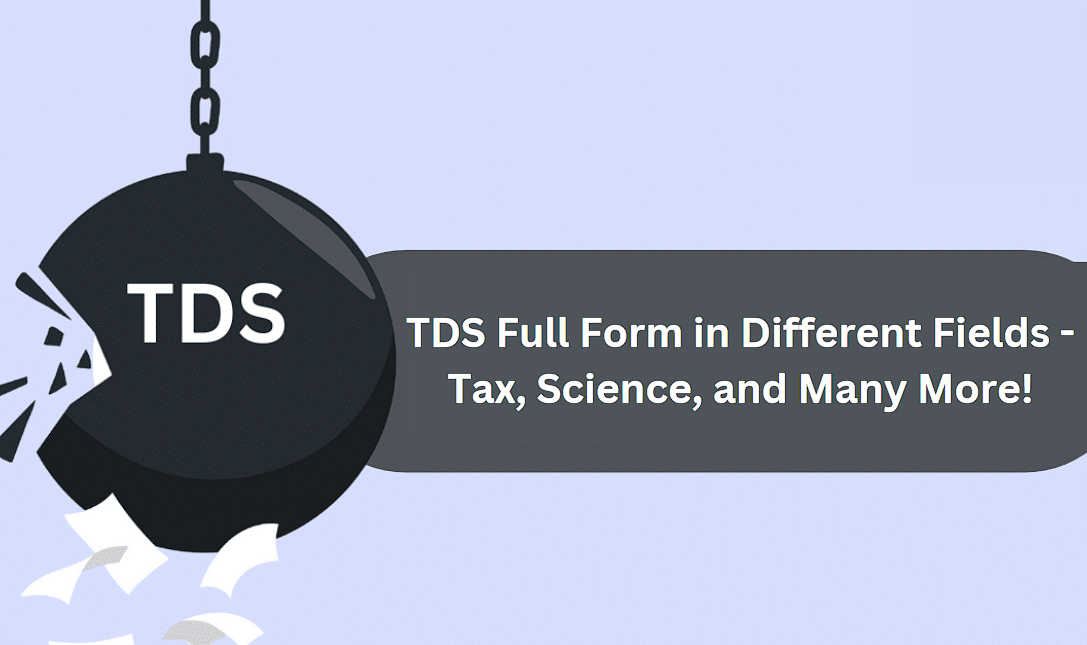Somewhere you must have come across the term “TDS”, but could you have imagined that it could have some other meaning in some other context? Be it finance, science, or technology; “TDS” holds diverse meanings corresponding to each particular field. This blog will relate some of the common full forms of TDS and what exactly they mean in different fields.
1. Tax Deducted at Source (In Finance):
TDS stands for ‘Tax Deducted at Source.” It simply means the source collection of revenue for the government right at the time of payment. It is like a system to ensure the taxes are paid off at the very beginning that may or may not go into the pocket of the individual or business receiving it.
In other words, if one has a salary, an employer would deduct a certain amount of salary and deposit the same directly to the credit of the government. So, in that way, the tax is already paid, and only the net amount is received.
Example: “My employer deducted TDS from my salary before transferring it into my account.”
2. Total Dissolved Solids (In Water Quality):
TDS means Total Dissolved Solids. This term is related to the quality of water. It ensures an appropriate amount of those dissolved substances in water, including minerals and salts with organic matter. Water with high TDS will taste salty or even weird. Contrary to this, low TDS water is considered purer water.
Many people test the quality of drinking water using TDS meters. The lesser the TDS, the cleaner the water usually is.
Example: “We passed the water through a TDS meter, and the result indicated that it had a high level of dissolved solids in it.”
3. Time Domain Spectroscopy (In Science):
TDS, in scientific research, stands for Time Domain Spectroscopy. It is a technique of testing materials by exposure to electromagnetic waves and mapping a response relative to the time course taken. Their enormous utilities in physics, engineering, and materials science are reasons that many substances act differently at different frequencies. This also provides a means of discovering new materials and technologies.
Example: “Scientists made use of TDS to analyze the optical properties of a new material.”
4. Technical Data Sheet (In Technology):
TDS means Technical Data Sheet. In the modern technological world, this is quite an informative document featuring in detail the technical data of any particular product. Whether you are buying a new gadget, a type of paint, or machinery, the TDS will tell you all you need to know about its features, uses, and performance.
Example: “I checked on the TDS of the product before purchasing it to ascertain whether it would serve my needs.”
5. Traffic Data Service (In Traffic)
TDS stands for Traffic Data Service in the transportation industry. It involves data collection and analysis regarding traffic, aiming at improving the conditions of the road, managing congestion, and enhancing road safety. Many smart cities globally apply TDS systems to maintain smooth traffic flow.
Example: “The city put in place the TDS so that the traffic signals are performing optimally at rush hour.”
Conclusion
Most of the full forms of “TDS” can be seen according to the industry that is being referred to, as explained above. Be it taxes, water quality, scientific research, or even traffic management, TDS has prime importance. Knowledge about the right full form and correct context will allow a better understanding of the subject.
Next time you come across TDS, remember the context in which you find it. It might just be referring to something entirely different.
Follow ustoday360 to Read More Blogs.












Leave a Reply